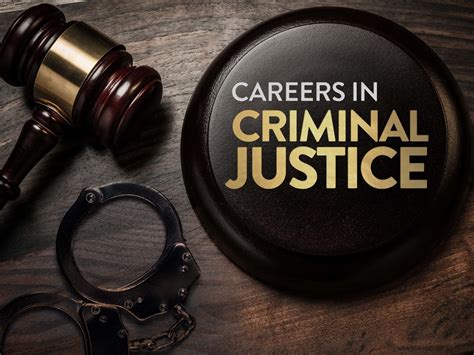The field of criminal justice is a multifaceted and dynamic sector that encompasses various careers, from law enforcement and corrections to forensic science and cybersecurity. A degree in criminal justice can open doors to a wide range of professional opportunities, allowing individuals to make a meaningful impact in their communities. In this article, we will delve into the diverse career paths available to those with a criminal justice degree, highlighting the skills, knowledge, and expertise required for success in this field.
Introduction to Criminal Justice Careers

A criminal justice degree provides students with a comprehensive understanding of the criminal justice system, including the roles and responsibilities of law enforcement, courts, and corrections. This foundational knowledge is essential for pursuing careers in fields such as policing, investigations, and forensic science. With a strong focus on critical thinking, problem-solving, and communication, a criminal justice degree can also lead to opportunities in fields like cybersecurity, emergency management, and social justice.
Key Points
- A criminal justice degree can lead to careers in law enforcement, corrections, and forensic science
- Skills such as critical thinking, problem-solving, and communication are essential for success in the field
- Careers in cybersecurity, emergency management, and social justice are also available to those with a criminal justice degree
- A strong understanding of the criminal justice system and its components is crucial for success
- Continuing education and professional development are vital for staying current in the field
Careers in Law Enforcement

Law enforcement careers are a popular choice for those with a criminal justice degree. These careers can range from police officers and detectives to federal agents and border patrol officers. Some of the key skills required for success in law enforcement include: physical fitness, communication skills, and the ability to think critically in high-pressure situations. According to the Bureau of Labor Statistics (BLS), employment of police and detectives is projected to grow 3% from 2020 to 2030, which is slower than the average for all occupations.
Policing and Investigations
Policing and investigations are critical components of the criminal justice system. Careers in these fields involve working with communities to prevent and investigate crimes, as well as gathering evidence and testifying in court. Some of the key careers in policing and investigations include:- Police officer
- Detective
- Criminal investigator
- Forensic scientist
| Career | Median Salary | Job Outlook |
|---|---|---|
| Police Officer | $61,380 | 3% growth |
| Detective | $83,170 | 3% growth |
| Criminal Investigator | $83,170 | 3% growth |
| Forensic Scientist | $62,490 | 14% growth |

Careers in Corrections
Careers in corrections involve working with individuals who have been convicted of crimes, with the goal of rehabilitating and reintegrating them into society. Some of the key careers in corrections include:- Corrections officer
- Probation officer
- Parole officer
- Counselor
Rehabilitation and Reintegration
Rehabilitation and reintegration are critical components of the corrections system. Careers in these fields involve working with individuals to address underlying issues that may have contributed to their criminal behavior, as well as providing support and resources to help them reintegrate into society. Some of the key skills required for success in rehabilitation and reintegration include: communication skills, empathy, and the ability to think critically about complex social issues.What are some of the most in-demand careers in criminal justice?
+Some of the most in-demand careers in criminal justice include police officers, detectives, forensic scientists, and cybersecurity specialists.
What skills are required for success in a criminal justice career?
+Some of the key skills required for success in a criminal justice career include critical thinking, problem-solving, communication, and physical fitness.
How can I get started in a criminal justice career?
+To get started in a criminal justice career, it's essential to earn a degree in criminal justice or a related field, gain relevant experience through internships or volunteer work, and stay current with industry trends and developments.
In conclusion, a degree in criminal justice can lead to a wide range of career opportunities, from law enforcement and corrections to forensic science and cybersecurity. By understanding the skills, knowledge, and expertise required for success in these fields, individuals can make informed decisions about their career paths and pursue rewarding and challenging careers in the field of criminal justice.
Meta description: Discover the diverse career paths available to those with a criminal justice degree, from law enforcement and corrections to forensic science and cybersecurity. Learn about the skills, knowledge, and expertise required for success in these fields and get started on your career path today. (149 characters)
